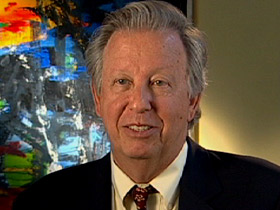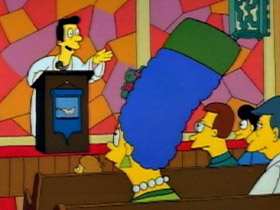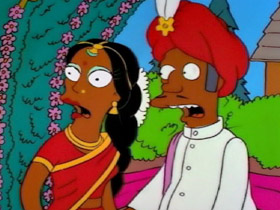In This Episode << SLIDE LEFT TO SEE ADDITIONAL SEGMENTS
Religion and the Simpsons
Over the years, The Simpsons has become known for its sharp-edged satire. But, as Kim Lawton reports, there’s also a surprising focus on spirituality.
BOB ABERNETHY, anchor: This weekend The Simpsons Movie opened in theaters across the country. It's based on Fox's popular and provocative TV series. Over the years, The Simpsons has become known for its sharp-edged satire. But, as Kim Lawton reports, there's also a surprising focus on spirituality.
KIM LAWTON: They're silly, often irreverent, and sometimes downright wicked. But The Simpsons also may be one of the most interesting examinations of religion in pop culture today.
MARK PINSKY (Author, "The Gospel According to The Simpsons"): The Simpsons say grace at meals. They attend church on Sundays. They read and refer to the Bible, and they pray out loud, although sometimes only under desperate circumstances. The Simpsons is not a show about religion, but it's about a family in which religion plays a part, and in that sense it's really reflective of what most Americans do and feel about religion.

LAWTON: Mark Pinsky is the religion writer for the Orlando Sentinel and author of the bestselling book, The Gospel According to The Simpsons. The new Simpsons Movie builds on the franchise that he says broke ground in dealing with issues of faith on a primetime TV show.
Mr. PINSKY: Except for those, of course, that are built around a religious premise, like Seventh Heaven or Touched by an Angel or Highway to Heaven, for The Simpsons it's just a part of their lives. But in that way it's in marked contrast to most commercial television where religion is almost wholly absent.
LAWTON: In the 18 years it's been on the air, The Simpsons has become a true cultural phenomenon. It's the longest running television sitcom in history, and it is broadcast in more than 70 nations, reaching an estimated audience of 60 million people every week. Pinsky is one of many adult viewers who got drawn into The Simpsons through his children.
Mr. PINSKY: When it comes to popular culture, I'm kind of tough on commercial TV, and I said, "Well, here's the deal. We'll sit together, I'll have the remote, and we'll watch. If it's okay, we'll keep watching." The first thing that I noticed was that it was okay for my kids. The second thing I noticed was there was all this religion in it.

LAWTON: The Simpsons patriarch, Homer, is an often clueless Christian who, Pinsky says, is really a borderline pagan.
HOMER SIMPSON (from The Simpsons): Oh Lord, be honest. Are we the most pathetic family in the universe or what?
SIMPSON FAMILY: Amen.
Mr. PINSKY: His Christianity is sort of fear-based. He often confuses God with Superman. His wife Marge is a really true believer, a sincere believer, willing to make that leap of faith.
LAWTON: Their mouthy, misbehaving son Bart also has a spiritual side.
Mr. PINSKY: Bart, many believe, is the devil incarnate. But when Bart gets in trouble, in deep trouble, he prays, and he prays sincerely. It's not fake, although once Lisa goes by his doorway when he's praying desperately, and she says, "Prayer, the last refuge of a scoundrel."
LISA SIMPSON (from The Simpsons): I don't know who or what God is exactly. All I know is he's a force more powerful than Mom and Dad put together, and you owe him big.

LAWTON: Bart's sister Lisa has been through her own spiritual explorations.
Mr. PINSKY: For most of the show's run, she was the voice of mainline Protestantism, the Social Gospel, a skeptical believer but a believer. And finally, when her church became sort of too seeker sensitive, too commercial, she went on a faith journey, and she ended up being a Buddhist, with the help, of course, of the actor Richard Gere.
LAWTON: The Simpson family and most of their neighbors attend the First Church of Springfield.
Mr. PINSKY: It's kind of a mainline Protestant church. They don't define what it is, but they call it the "Presbylutheran" church. The theology is kind of lowest common denominator. The pastor is Reverend Lovejoy, who incidentally does not love joy. He's kind of a venal character. He suffers from preacher burnout. His wife is a shrew. He has money problems. His daughter is a typical preacher's kid, sort of a demon seed. It puts him through an awful lot. So he's an object of satire and ridicule, but underneath there's a lot of profound material about the ministry today.
LAWTON: In fact, The Simpsons has tackled a host of complex theological issues, including salvation, divine omnipotence, the end times, miracles, heaven and hell, cults, religious exclusivity, and the nature of the soul.

Mr. PINSKY: It's hard to remind yourself that a discussion at this level is happening in a cartoon comedy.
LAWTON: One of the favorite themes is religious diversity.
Mr. PINSKY: Ned Flanders, who's the evangelical next door and on the surface is kind of a dufus guy -- he's overzealous, but underneath his heart is really good. And as much scorn and disrespect that Homer heaps on him, Ned always returns it with love. Younger evangelicals around the country, I'm told, have adopted Ned as kind of an unofficial mascot.
LAWTON: There's Krusty the clown, a non-religious Jew who clashes with more traditional Jews. And Apu, the Hindu immigrant who works at Springfield's fictional Kwik-E-Mart convenience store.
Mr. PINSKY: And through him much about Hinduism is explained to people who might not know Hindus. On the surface it's funny, like everything in The Simpsons. But underneath it's very respectful.
LAWTON: Indeed, most of the religious discussion is through humor, but Pinsky says at a closer look it can also be surprisingly sophisticated.

Mr. PINSKY: The critics say that The Simpsons is a show that rewards intelligence, and it's written on many levels, and the more you pay attention and, frankly, the more intelligent you are, the more jokes you'll get. They know the stuff that they are making light of in some ways, and it's a very knowing, insiders' satire.
BART SIMPSON (from The Simpsons): Church, cult? Cult, church? So we get bored someplace else every Sunday. Does this really change our day-to-day life?
LAWTON: The humor is sharp-edged, and over the years there have been complaints from offended religious people.
Mr. PINSKY: Organized religion, the church, the preacher -- they take their whacks like every other institution that The Simpsons deals with -- not as severe as in some shows, I would have to say. At the same time, sincere religious faith and belief [are] never satirized.
LAWTON: But many religious leaders, including some conservative evangelicals, have come to appreciate the Simpsons' treatment of faith.
UNIDENTIFIED RADIO SHOW CALLER (from The Simpsons): "Yes, hi. With all the suffering and injustice in the world, do you ever wonder if God really exists?"

LOVEJOY: Nope.
PRIEST: Not for a second.
RABBI: Not at all.
Mr. PINSKY: The existence of God is never questioned, and there's an inside joke, actually, in The Simpsons that when God appears, unlike most cartoon characters since Walt Disney, God has five fingers. But everybody else in The Simpsons has four fingers: three fingers and a thumb. So it's a sly joke that the writers are making that God is real, but The Simpsons characters are not real.
LAWTON: Religion has a role in the new Simpsons Movie as well, although the film doesn't focus on issues of faith. A pivotal early scene takes place at First Church, and Homer is his usual irreverent self. Bart wishes the evangelical Ned was his father instead of Homer, and indigenous Eskimo spirituality helps save the day. There are themes of family and right-versus-wrong, but this is no fluffy devotional flick. There's profanity, lots of sarcasm, underage drinking and even some cartoon nudity.
HOMER (from The Simpsons Movie, looking at the Bible): This book doesn't have any answers!
LAWTON: The Simpsons' brand of humor isn't for all people of faith, but Pinsky believes the franchise has contributed to the conversation about religion in America, particularly among young people who might otherwise have been turned off by the subject.
Mr. PINSKY: When they're in the commons room or on the sofa on a Sunday night watching an animated comedy, their minds are much more open to things, and even humorous accounts of religion, of faith -- I think their minds are more open to it.
LAWTON: And, Pinsky adds, for good or for ill, The Simpsons success is paving the way for other comedies to include religion as well.
I'm Kim Lawton in Orlando.
Over the years, The Simpsons has become known for its sharp-edged satire. But, as Kim Lawton reports, there’s also a surprising focus on spirituality.